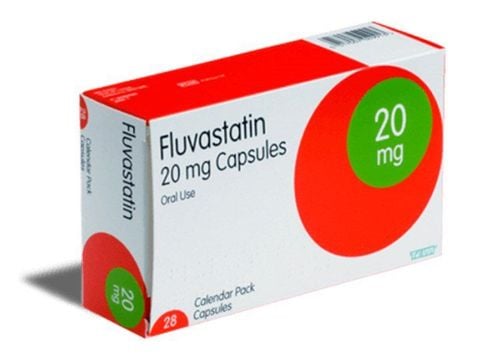This is an automatically translated article.
Alipid 20 helps lower bad cholesterol in the blood, reducing the risk of coronary heart disease and other cardiovascular problems. During treatment with Alipid, patients need to ensure that they adhere to the regimen prescribed by their doctor.
1. What is Alipid 20?
Alipid 20 belongs to the group of cardiovascular drugs, is prepared in the form of film-coated tablets, belonging to OPV Pharmaceutical Company circulating in Vietnam. The drug Alipid 20 is used to lower blood lipid synthesis, prevent cardiovascular events and the development of coronary atherosclerosis. Alipid is packaged in a box of 1 blister x 10 tablets or a box of 3 blisters x 10 tablets. Each tablet contains the following main ingredients:
Main active ingredient: Atorvastatin calcium 20mg. Other excipients just enough for one tablet: Calcium carbonate, straight lactose, sodium lauryl sulfate, croscarmellose sodium, microcrystalline cellulose PH 102, magnesium stearate and opadry II white.
2. Indications and uses of Alipid 20
2.1. Indications for the use of Alipid 20
Alipid drugs are often prescribed by doctors for the following cases:
Support treatment for patients applying a diet to help reduce total cholesterol, bad LDL cholesterol, triglycerides, apolipoprotein B, and help increase levels of good cholesterol HDL for people with mixed dyslipidemia (types IIa and IIb) or primary hypercholesterolemia. Helps reduce blood triglycerides type IV. A therapeutic adjunct to other lipid-lowering measures, thereby lowering total and LDL cholesterol in individuals with homozygous familial hypercholesterolemia. 2.2. Uses of Alipid 20 The main active ingredient Atorvastatin in Alipid 20mg is a substance belonging to the statin group, with the pharmacological effect of reducing cholesterol levels in the body. Atorvastatin inhibits the production of cholesterol in the liver by blocking HMGCoA reductase (the enzyme that makes cholesterol). In addition, the active ingredient Atorvastatin also helps reduce levels of total cholesterol and bad LDL cholesterol (the cholesterol that increases the risk of coronary heart disease).
Thanks to the effect of lowering LDL cholesterol, Alipid drugs can slow the progression and even reverse coronary heart disease. Unlike other drugs belonging to the same cardiovascular group, alipid 20mg also works to reduce triglyceride levels in the blood, thereby reducing the risk of coronary heart disease.
3. Dosage and how to use Alipid 20
3.1. Dosage of the drug Alipid 20
Dosage of Alipid drug will depend on the purpose of treatment as well as the patient's health condition, specifically:
Dose for people with hypercholesterolemia (no or heterozygous familial) and dyslipidemia Mixed blood: Use a starting dose of 10-20mg / time / day. For patients requiring significant reductions in LDL cholesterol levels (> 45%) alipid should be initiated at a dose of 40 mg once daily. The therapeutic dose range of alipid will range from 10 - 80mg / time / day, avoid using more. Dose for patients with homozygous familial hypercholesterolemia: 10 to 80 mg/day, possibly in combination with some other non-pharmacological lipid-lowering measures, such as diet. Combination treatment of alipid: Can be used in combination with Resin to increase the effectiveness of treatment, refer to the dose prescribed by the doctor. Dosage of Alipid for people with renal failure: Use the usual dose from 10 to 80mg / time / day, no need to adjust the dose. Children > 10 years of age with hypercholesterolemia: Initial dose is 10mg/day, then can be increased to 20mg/day. Before deciding to adjust the dose of Alipid, the doctor will evaluate the blood lipid index from 2 to 4 weeks to make the appropriate consideration.
3.2. How to use Alipid 20 Alipid 20 should be taken with filtered water in an adequate amount. The drug can be used at any time of the day, regardless of the meal. During the treatment with Alipid, the patient should take the full dose as directed by the doctor, avoid arbitrarily stopping halfway because this may reduce the effectiveness of the treatment.
3.3. Contraindication to the use of Alipid 20 Absolutely do not use Alipid 20mg for the following subjects:
Patients who are allergic or show hypersensitivity to HMGCoA reductase inhibitors or any drug in Alipid . Patients with persistently elevated serum transaminases or progressive liver disease of unknown cause. Do not use Alipid for pregnant women or nursing mothers.
4. Some side effects of the drug Alipid 20
Alipid 20 may bring some side effects to patients during treatment, specifically:
*Common side effects:
Digestive symptoms such as flatulence, constipation, diarrhea, nausea abdominal pain (found in about 5% of patients). Neuromuscular symptoms such as arthralgia or myalgia. Liver problems. *Uncommon side effects:
Skin reactions such as itching, rash, urticaria, ... Respiratory symptoms such as cough, pharyngitis, sinusitis and rhinitis. Myopathy, including muscle weakness and increased plasma GPK levels. * Rare side effects:
Manifestations of cognitive impairment such as confusion, memory loss,... Rhabdomyolysis, myositis, and acute renal failure secondary to myoglobinuria. Increased HbA1c levels, which increase the risk of diabetes. 5. Precautions for treatment with Alipid 20 5.1. General note when taking Alipid 20mg Before and during the use of Alipid medicine, patients need to be careful of the following:
Alcoholics, liver disease or liver failure need to be very careful when using Alipid. Drivers of vehicles and machines should exercise caution when taking Alipid because it can cause side effects on the central nervous system. Do not use the drug for children under 10 years old, lactating women and pregnant women because Alipid can affect the health of children. 5.2. Does Alipid interact with other drugs? When using 2 or more drugs together at the same time can lead to drug interactions, causing synergistic or antagonistic phenomena. According to experts, the risk of rhabdomyolysis is significantly increased when you use Alipid with fibric acid derivatives, niacin, cyclosporin, Azole antifungals, and erythromycin. In addition, co-administration of Alipid with antacids may reduce the concentration of Atorvastatin.
When a patient encounters any adverse event related to the interaction of Alipid with other medicinal products, immediately notify the doctor for specific advice. Besides, before treatment with Alipid, patients also need to inform the doctor about the drugs they are using. If necessary, the doctor may recommend that the patient stay away or reduce the dose of the drug to avoid interactions.
5.3. Conditions for storing Alipid drugs Alipid drugs should be stored at a temperature of 5 - 30 degrees Celsius, protected from light and stored in a sealed container. Note: Do not keep Alipid medicine out of reach of children, and keep it away from pets. Before using Alipid, you need to carefully check the expiry date indicated on the product label.
Please dial HOTLINE for more information or register for an appointment HERE. Download MyVinmec app to make appointments faster and to manage your bookings easily.













